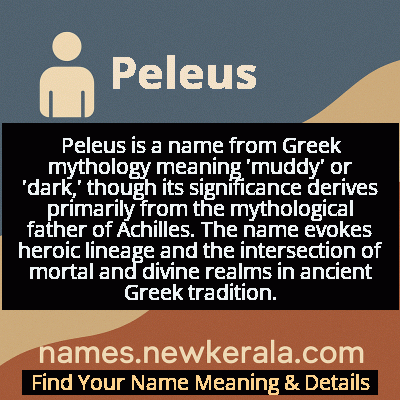Peleus Name Meaning & Details
Origin, Popularity, Numerology Analysis & Name Meaning of Peleus
Discover the origin, meaning, and cultural significance of the name PELEUS. Delve into its historical roots and explore the lasting impact it has had on communities and traditions.
Name
Peleus
Gender
Male
Origin
Greek
Lucky Number
6
Meaning of the Name - Peleus
Peleus is a name from Greek mythology meaning 'muddy' or 'dark,' though its significance derives primarily from the mythological father of Achilles. The name evokes heroic lineage and the intersection of mortal and divine realms in ancient Greek tradition.
Peleus - Complete Numerology Analysis
Your Numerology Number
Based on Pythagorean Numerology System
Ruling Planet
Venus
Positive Nature
Harmonious, responsible, caring, and artistic.
Negative Traits
Overly idealistic, superficial, possessive, or jealous.
Lucky Colours
Pink, turquoise.
Lucky Days
Friday.
Lucky Stones
Diamond, turquoise.
Harmony Numbers
2, 3, 9.
Best Suited Professions
Artists, musicians, teachers, healthcare workers.
What People Like About You
Warmth, nurturing nature, artistic flair.
Famous People Named Peleus
Peleus of Greek Myth
Mythological Hero
Father of Achilles, Argonaut, participant in Calydonian Boar Hunt
Peleus (Historical Reference)
Ancient Ruler
King of Phthia in Thessaly, mentioned in Homer's Iliad
Peleus (Literary Character)
Mythological Figure
Central figure in wedding to Thetis that led to Trojan War
Name Variations & International Equivalents
Click on blue names to explore their detailed meanings. Gray names with will be available soon.
Cultural & Historical Significance
As king of Phthia and father of Achilles, Peleus embodies the Greek ideal of heroic kingship—combining martial prowess with wise leadership. His story reflects important cultural values including xenia (guest-friendship), as seen in his relationship with Cheiron the centaur who educated both him and his son, and kleos (glory) achieved through heroic deeds. The preservation of his armor and spear, which Achilles later uses in the Iliad, symbolizes the transmission of heroic virtue across generations, a concept central to Greek understanding of legacy and honor.
Extended Personality Analysis
Peleus exemplifies the archetypal Greek hero with a complex blend of virtues and human limitations. His character is defined by remarkable perseverance, demonstrated through his survival of exile and successful completion of numerous dangerous quests. Unlike many mythological figures who rely solely on divine favor or brute strength, Peleus shows strategic intelligence and diplomatic skill, particularly in his interactions with both mortal and divine beings. His ability to win Thetis as his bride, despite her divine nature and resistance, showcases a unique combination of determination, respect for protocol, and cleverness that sets him apart from more one-dimensional heroes.
The mythological tradition portrays Peleus as fundamentally honorable yet pragmatic, capable of navigating complex political and personal situations. His relationships with other heroes—including his brother Telamon and fellow Argonauts—reveal a man who values loyalty and cooperation while maintaining his own authority. As a father, he demonstrates both affection and responsibility, ensuring Achilles receives the best possible education and preparation for his destined role. This multifaceted personality makes Peleus a more relatable and psychologically complex figure than many mythological characters, embodying the Greek ideal of balanced excellence across multiple domains of life.
Modern Usage & Popularity
In contemporary times, the name Peleus remains exceptionally rare and is primarily confined to academic circles, classical studies enthusiasts, and families with strong connections to Greek heritage. It has never appeared in popular baby name rankings in English-speaking countries and maintains a status as a 'scholar's choice' rather than a mainstream option. The name occasionally surfaces in historical fiction, fantasy literature, and classical adaptations, where it serves to evoke Greek mythological themes. Among modern Greek families, traditional mythological names have seen some revival, but Peleus remains less common than names like Achilles, Odysseus, or Alexander. Its usage reflects a deliberate choice to honor classical tradition rather than follow contemporary naming trends, making it a distinctive option for parents seeking names with deep cultural and literary resonance.
Symbolic & Spiritual Meanings
Peleus symbolizes the profound Greek concept of mortal achievement within divinely ordained limitations. His entire mythological narrative represents humanity's capacity to achieve greatness despite inherent constraints, embodying the tension between fate and free will that permeates Greek thought. The name carries deep metaphorical significance as a bridge between worlds—mortal and divine, human and elemental (through his marriage to the sea nymph Thetis). It represents the idea that true heroism involves not just physical courage but also wisdom, perseverance, and the ability to navigate complex relationships and responsibilities. The story of Peleus wrestling with the shape-shifting Thetis serves as a powerful metaphor for the human struggle to comprehend and engage with forces beyond ordinary understanding, while his ultimate success demonstrates that determined effort can overcome seemingly impossible challenges.

